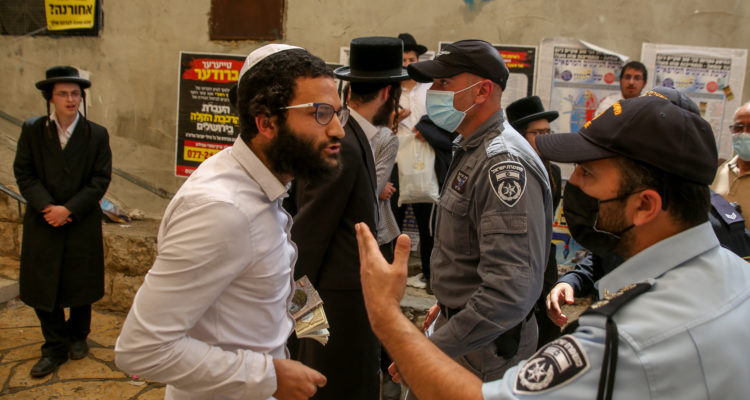A group of retired police commissioners called on the prime minister to launch an independent commission with wide-ranging powers to investigate.
By AP and World Israel News Staff
Officials have come under scrutiny for ignoring warnings about safety lapses at the Mount Meron yearly religious festival as the country mourned 45 victims killed in a crush in Israel’s worst civil disaster.
The event drew some 100,000 people and has drawn more than twice that in the past.
On Sunday, a group of retired police commissioners called on the prime minister to launch an independent commission with wide-ranging powers. The body would have the authority to probe senior politicians and decision-makers, going beyond a Justice Ministry inquiry now underway that is looking into possible misconduct by police officers at the site.
The state comptroller announced Monday that he would conduct an investigation into the “preventable” tragedy. Previous state comptroller reports have warned of the dangers of disaster at Mount Meron, which yearly sees larger crowds than can safely be handled at the site with its subpar infrastructure.
Mount Meron is one of the most visited religious sites in Israel, second only to the Western Wall. It is believed to be the burial place of a prominent second century Torah sage, Rabbi Shimon Bar Yochai. Religious Jews, mainly haredim, visit especially on the holiday of Lag BaOmer, which is marked by large bonfires, singing and dancing.
The crush last week, the deadliest civil disaster in Israel’s history, surpassed by one death the Mount Carmel fire which took place on Dec. 2, 2010.
Although a plan was devised which would have severely limited the number of visitors this year, as corona is still considered an issue, that plan fell by the wayside under pressure to hold the event.
Before the tragedy, Rabbi Yossi Schwinger, head of the National Center for Development of Holy Places, meaning to give credit, praised Interior Minister Aryeh Deri, a member of the ultra-Orthodox Shas party, for pushing for the Mount Meron celebration to take place.
“Rabbi Deri … saved the whole thing. He fought like a lion, and he softened plan after plan, thank God, and here we see the results,” Schwinger said.
Several retired police commanders told Israeli TV channels over the weekend that during their years on the job they came under intense political pressure to accede to the wishes of religious politicians. They said they had no authority to enforce safety regulations, such as limiting attendance.
A common complaint heard in the aftermath of the crush was that no single authority was in charge of managing the festival safety.
The site is ostensibly managed by the Religious Services Ministry’s National Center for Holy Places but is divided up between an assortment of religious trusts.
Eli Ben Dahan, a former deputy religious services minister, said in an interview with Kan radio, “There’s no one person about whom it can be said that they run the event, that everything falls on their shoulders.”
He called for it to be brought under a single administrative authority.
“I don’t think that a place in the state of Israel should be extraterritorial, that the state doesn’t have any control over it, doesn’t manage it, isn’t responsible for it,” he said.
Observers have long warned the site wasn’t equipped to handle the large number of visitors on the holiday, and that the existing state of infrastructure was a safety risk.
The warnings became reality early Friday when thousands of people leaving one area of the site funneled through a narrow passageway descending the mountain. A slick slope and stairs caused people to slip and fall, resulting in a human avalanche that killed 45 people and injured at least 150. Ten of the dead were boys and teens.
By Sunday morning, health officials had identified all those killed. All but one of the dead were buried in hurried funerals, with a break during the Jewish Sabbath between sundown Friday and sundown Saturday. One person who attended Thursday night’s event was still missing.
Israel marked a national day of mourning Sunday. Flags flew at half-staff in Israel and its diplomatic missions abroad, and sports and cultural events were canceled.




